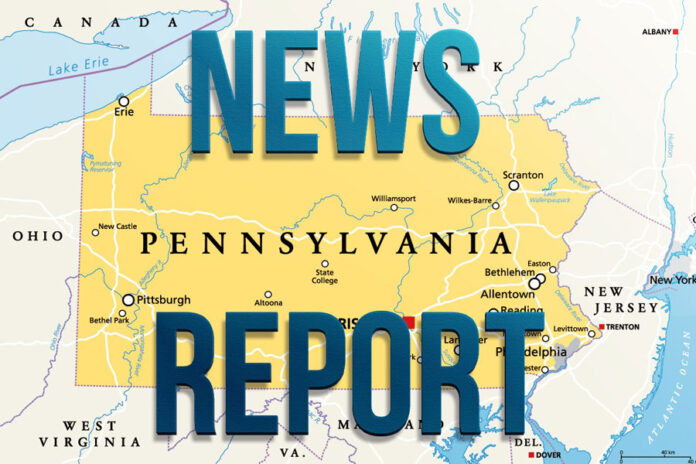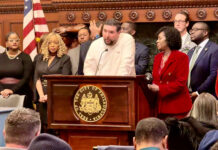Pittsburgh Post-Gazette. April 13, 2023
Editorial: Utilities commission needs utilities experts, not politicos
Natural gas explosions, pipeline ruptures and the disastrous Norfolk Southern train derailment in East Palestine, Ohio, have underscored staffing problems at the Pennsylvania Public Utility Commission (PUC), as well as urgent needs for reform. The commission that regulates essential infrastructure is operating without leadership, despite growing scrutiny of the state’s oversight of public utilities.
The PUC regulates all businesses and industries that provide public services in the commonwealth — including setting rates for electric, gas, water, wastewater utilities. Despite those enormous responsibilities, the agency has not had an executive director since the beginning of the year, Ford Turner of the Post-Gazette reported. Equally risky, given the importance of litigation to the PUC’s mission, the chief counsel’s office also is empty.
Only one of the five PUC board members has significant experience in public utilities: Ralph V. Yanora of Luzerne County, a master plumber and founder of a company that works with municipal water systems. Three other commissioners, including two appointed by former Gov. Tom Wolf in September 2022, are products of Harrisburg’s political-legislative ecosystem, with experience as aides and lobbyists, but not directly in public utilities.
Given the enormous public responsibility of the five-person PUC board, Gov. Josh Shapiro should appoint commissioners with extensive experience in the sectors the agency regulates — not favored legislative staffers and political operatives, as has too often been the case.
To use these appointments, which pay more than $160,000 a year, as rewards for loyal political service, is irresponsible. The term of the commission’s long-time chairperson, Gladys Brown Dutrieuille, expired on April 1, and Mr. Shapiro has yet to announce her reappointment or replacement. This is an opportunity to pick someone with professional experience in utilities — not just in politics — to head the PUC and give the agency the stability it currently lacks.
The PUC’s website shows further high-level vacancies: among them, the Director of Regulatory Affairs, the Executive Deputy Chief Counsel for Transportation, and the Supervisor for management audits in the Pittsburgh region.
Routine staff turnover accounts for some of this, but a spokesman acknowledged staffing challenges and told the Post-Gazette its employees’ skills are highly attractive to private companies. Still, long-time vacancies, without public notice, in such an essential agency should have demanded the attention of the five commissioners governing the commission.
By holding up appointments during Mr. Wolf’s term, Republicans cynically used the PUC board as a bargaining chip, resulting in multiple years-long vacancies. Now the commission is full, and it’s Mr. Shapiro’s job to continue to shape it. He must do better than his predecessor.
Pittsburgh Tribune-Review. April 13, 2023
Editorial: Figure out the source for state police fund money first
The idea of a dedicated fund to support the state police is a perfect illustration of Pennsylvania’s ongoing governmental challenges.
Gov. Josh Shapiro wants to pay the annual bill for the agency — about $1.4 billion — by replacing the $500 million or so that comes from the Motor License Fund with a new Public Safety and Protection Fund.
The reason for that is understandable. The Motor License Fund is filled by money from vehicle registrations, license fees and some of the highest gas taxes in the country.
The purpose of taking driving-related money is to support driving-related needs. People naturally expect that to be the maintenance of existing roads and bridges and construction of new ones. The state’s infrastructure needs work, as the 2022 collapse of the Fern Hollow Bridge showed.
Instead, about a sixth of the money generated goes to law enforcement. Finding a way to fix that is smart.
But nothing happens in Harrisburg without becoming a partisan issue, as a Spotlight PA story details. Democrats would like the laws built around the account to include collection of racial information from traffic stops, something the state police stopped doing between 2012 and 2021.
Republicans, meanwhile, think a fund takes away from the Legislature’s role of controlling purse strings. There’s a valid point there, but it is one blunted by the fact there are more than 150 such funds that do exactly what the state police fund would do — take dedicated money and use it for a dedicated purpose.
The real question about the fund should be less about whether it would cut into one side’s authority or if it could be used to push the other side’s agenda. It needs to be about where it would get money.
Shapiro wants to ask for $1 billion from vehicle sales tax as well as taxes on smoking products — both tobacco and vaping — and liquor. There could be $400 million in seed money from the Motor License Fund. There are no details about permanent income streams.
And here is where we hit the problem.
Harrisburg’s leaders — executive and lawmakers alike — always have reasons they like a plan or are opposed to it before anyone has fleshed out the facts of it all.
It isn’t that a dedicated fund is a bad idea. It might well be the best way to pay for police. But how can that be judged before locating the money? Would a bank lend you money for a mortgage based on the fact you have a bank account to write the checks but without knowing you have a job to provide the cash? Unlikely.
Determining the source of the money is critical, not just for immediate reasons but for the long term. If you want proof of how much that future impact matters, remember that we are just a few months from the Pennsylvania Turnpike Commission announcing the annual increase in rates, something lawmakers have locked us into through 2050.
Scranton Times-Tribune. April 17, 2023
Editorial: Part-time Legislature, full-time efficiency
During the two months that the “full-time” state House managed not to meet early this year, legislatures in several other states wrapped up their business — for the year.
As Republican Rep. Paul Schemel of Franklin County recently put it: “My district in southern Franklin County borders the Mason-Dixon line, and many of my constituents rightly point out that the Maryland General Assembly has already accomplished its work for the entire year. … Pennsylvania has not even gotten started. What a colossal waste of both time and money.”
Schemel plans to introduce a constitutional amendment to end Pennsylvania’s status as one of just 10 states with a full-time Legislature, and replacing it with a part-time body. It’s a worthy, if symbolic effort, destined for the same wastebasket where far less ambitious reform ideas, such as reducing the size of the bloated full-time Legislature, have been filed.
It’s a good idea in terms of cost alone. The Legislative Audit Advisory Commission recently filed its annual statement, finding that the Legislature’s operational spending for the fiscal year that ended June 30 totaled $392 million, an increase of $12 million over the previous year.
That amount is certain to climb during this fiscal year because of a massive pay raise (7.8%, $7,400) that the 203 representatives and 50 senators awarded themselves in December under an automatic cost-of-living adjustment tied to an inflation index, without so much as a motion or a vote. In December 2021, the lawmakers gave themselves an automatic 5.6% increase. Legislators also are eligible for a daily expense payment of $181 when they are in Harrisburg, for which they are not required to produce expense receipts.
The base pay for each legislator is now $102,844. Schemel’s proposal would reduce their part-time pay to $25,000.
But the greater impact would be on performance. As Schemel noted, many other legislatures have completed their work for the year while Pennsylvania’s has done little. Clearly, the part-time structure creates pressure to produce.
There is little doubt that most Pennsylvanians would embrace the opportunity to vote “yes” to create a part-time Legislature, which is why full-time legislators will ensure that voters never have the opportunity.
Wilkes-Barre Citizens’ Voice. April 13, 2023
Editorial: Lawmakers help deplete teachers’ ranks
State legislators conducted a hearing this week on the growing shortage of public school teachers, but failed to address their own policy failures that help to drive it.
The Penn State Center for Education Evaluation and Policy Analysis has found that 4,220 prospective teachers graduated from college after the 2021-2022 school year, one of the lowest numbers on record. There were fewer new graduates than the number of uncertified teachers working that year with emergency permits, 6,336.
Just a decade ago, in 2013, 16,000 new prospective teachers were ready to enter classrooms.
Some legislators and the Shapiro administration have proposed incentives such as student loan forgiveness, raising the minimum beginning salary from the current abysmal $18,500 to $50,000, mentorship and retention programs in districts with high turnover, and more.
During the House Education Committee hearing this week, several lawmakers contended that teaching already is a good job, citing time off and guaranteed pensions, and blamed teachers unions for workplace tension and low morale.
Those unions sometimes are their own worst enemies, but they are not the state policymakers and local districts responsible for school funding and administration.
While lawmakers ponder new policy to mitigate the shortage, they also should ponder how existing policy, for which they are responsible, has contributed to it.
The Commonwealth Court found in January, for example, that the Legislature violates the state constitution by inequitably distributing nearly $8 billion in state funding. Yet lawmakers have not even proposed an equitable plan.
Likewise, legislators have failed to correct a funding policy that provides charter schools with windfalls at the expense of conventional public schools.
Many lawmakers also focus on nonexistent or near-nonexistent “problems” such as “critical race theory,” transgender student accommodations and “dangerous” books, for their own political purposes. Doing so has created hostile atmospheres in many districts that add to existing low teacher morale from working, often, in substandard facilities with limited resources.
It shouldn’t be surprising that some lawmakers’ open warfare on public education has produced collateral damage in teachers’ retirements and resignations.
There is a great deal that lawmakers can do to alleviate the teacher shortage, but it has to begin with their own commitment to the very idea of public education.







